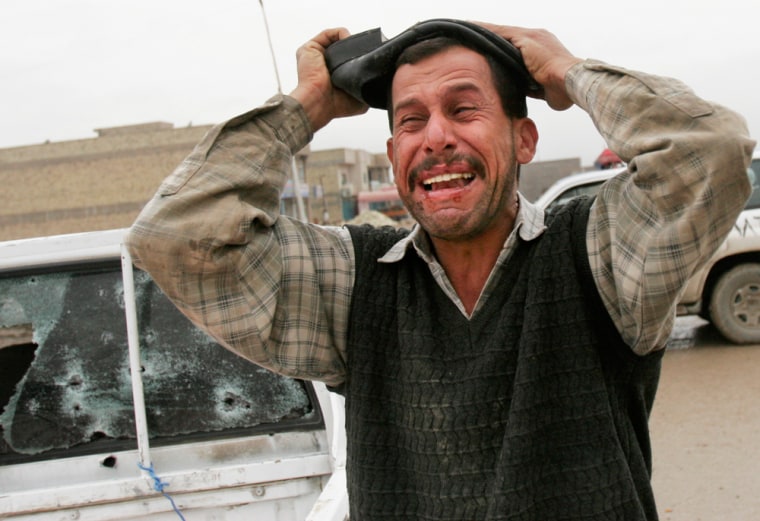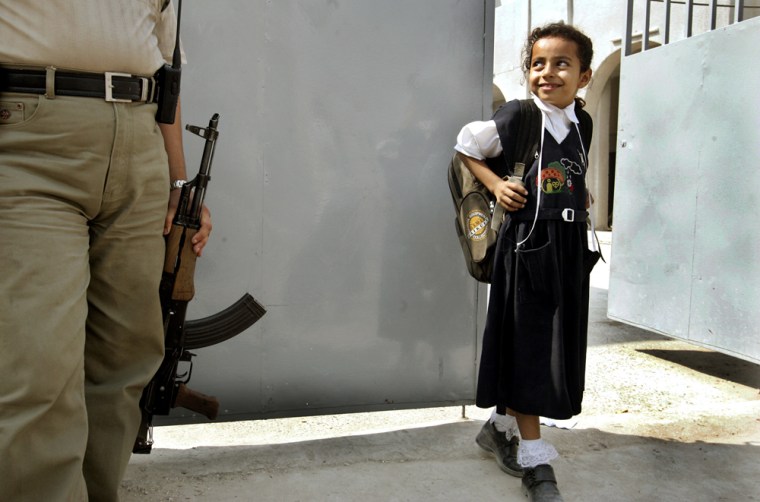When U.S.-led forces invaded Iraq two years ago, Adnan al-Eiby was thrilled. He thought that once Saddam Hussein was toppled, Iraq would become a flourishing Western-style democracy.
“But now, I walk down the street and all I see is death — innocent people blown up by terrorists and others shot by the Americans,” said the 32-year-old chauffeur. “I’m fed up with life. We pinned our hopes on the Americans but they let us down.”
A different take on the new Iraq comes from Hamid Balasim, a 34-year-old nuclear energy engineer once favored by Saddam’s regime. He says freedom matters even more than reconstructing Iraq or getting rich.
“Things are 1 million times better than Saddam’s days,” Balasim said. “Freedom is the essence of life.”
Two years after the U.S.-led invasion, Iraqis are split between hope and despair.
Freedom against a backdrop of violence
They have experienced the act of casting a vote in the first free and fair elections in Iraq’s modern history. But lawlessness prevails, and Iraq remains mired in acts of ferocity.
Although the United States last June transferred sovereignty to an Iraqi interim government led by Prime Minister Ayad Allawi, insurgents have carried on a relentless campaign of suicide bombings, kidnappings and beheadings. Hundreds more have died in such attacks since the Jan. 30 elections that will soon bring a Shiite-led government to power.
Rampant crime, power outages, unemployment at over 50 percent and a fuel crisis in one of the world’s prime oil-exporting countries have added to the despondency.
“What has the interim government done, anyway?” al-Eiby asked, squatting in his one-room apartment in Sadr City, a Shiite Muslim slum in Baghdad, as raw sewage lapped at his doorstep.
Plague of poverty
“Many people are struggling to find jobs, and our conditions have become more pathetic than that of the Afghans and the Palestinians,” he complained.

Al-Eiby specializes in driving people from Baghdad to Basra, a once well-paying occupation now hit hard by looters and insurgents who have turned Iraq’s highways and streets into death traps.
Although he lives in a slum, financial hard times led his landlord to increase his rent from 40,000 dinars ($27) to 100,000 dinars ($70) — a fortune for Sadr City.
Like al-Eiby, Balasim was also hit hard.
When the United States dismantled Iraq’s nuclear program after the invasion, he was given a lowly desk job at the Science and Technology Ministry and his salary was cut from about $200 to $135 a month.
‘Big picture’ provides some solace
But he says he only cares “about the big picture.”
“We voted in a free election, we read newspapers that openly criticize government officials, we can say what we want out loud — things that do not happen in other Arab countries with no security issues, things that were the stuff of movies for us,” he said.
More than 8 million Iraqis voted to elect a 275-National Assembly that is widely considered to be a first step on Iraq’s path to self-rule — and at the same time brought closer the day when Iraqis finally see the Americans leave.
Al-Eiby complained the elections may have given Iraqis a taste of democracy but have “not provided my family with bread and butter, nor do I feel safer now.”
His complaint is felt by hundreds of thousands of Iraqis, who remember more stable times under Saddam. Then, an ordinary Iraqi steering clear of politics could walk the streets without fear. Kidnap and murder were a tool to oppress Saddam’s perceived foes, and abduction for ransom and beheadings were almost unheard of. Now, nobody feels immune.
Surprising optimism
But a report issued in September by the Washington-based Center for Strategic and International Studies, based on wide-ranging interviews and polls, found that Iraqis have remained optimistic, “despite failures in security, services, economic opportunity.”
The report warned that the challenge faced by both Iraqi and American officials was to “harness and capitalize on Iraqis’ optimism” because “there is a real potential it could swing the other way if events in Iraq continue to trend negatively.”
Balasim, for one, was unconcerned.
“It is a matter of time,” he said, “like a sick person who’s recuperating: it just needs more time, and we’ll be better.”
